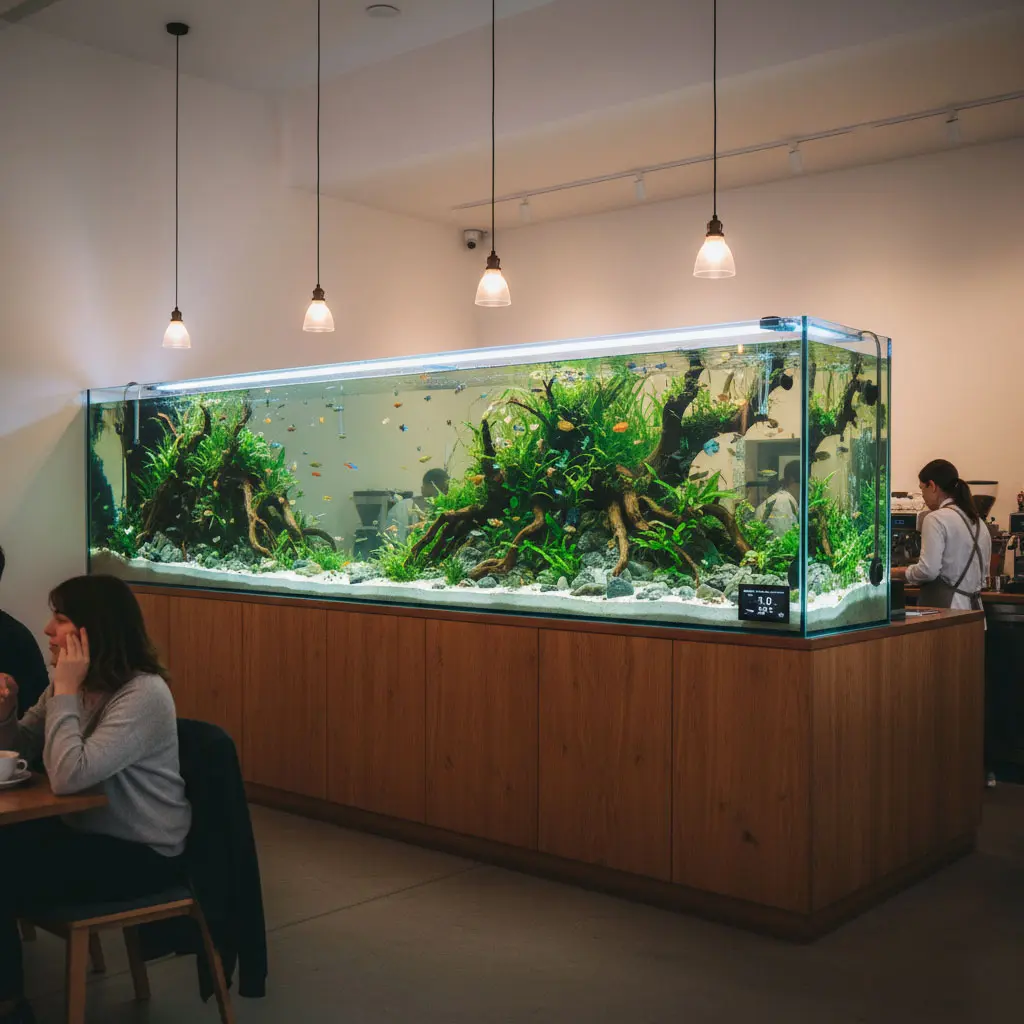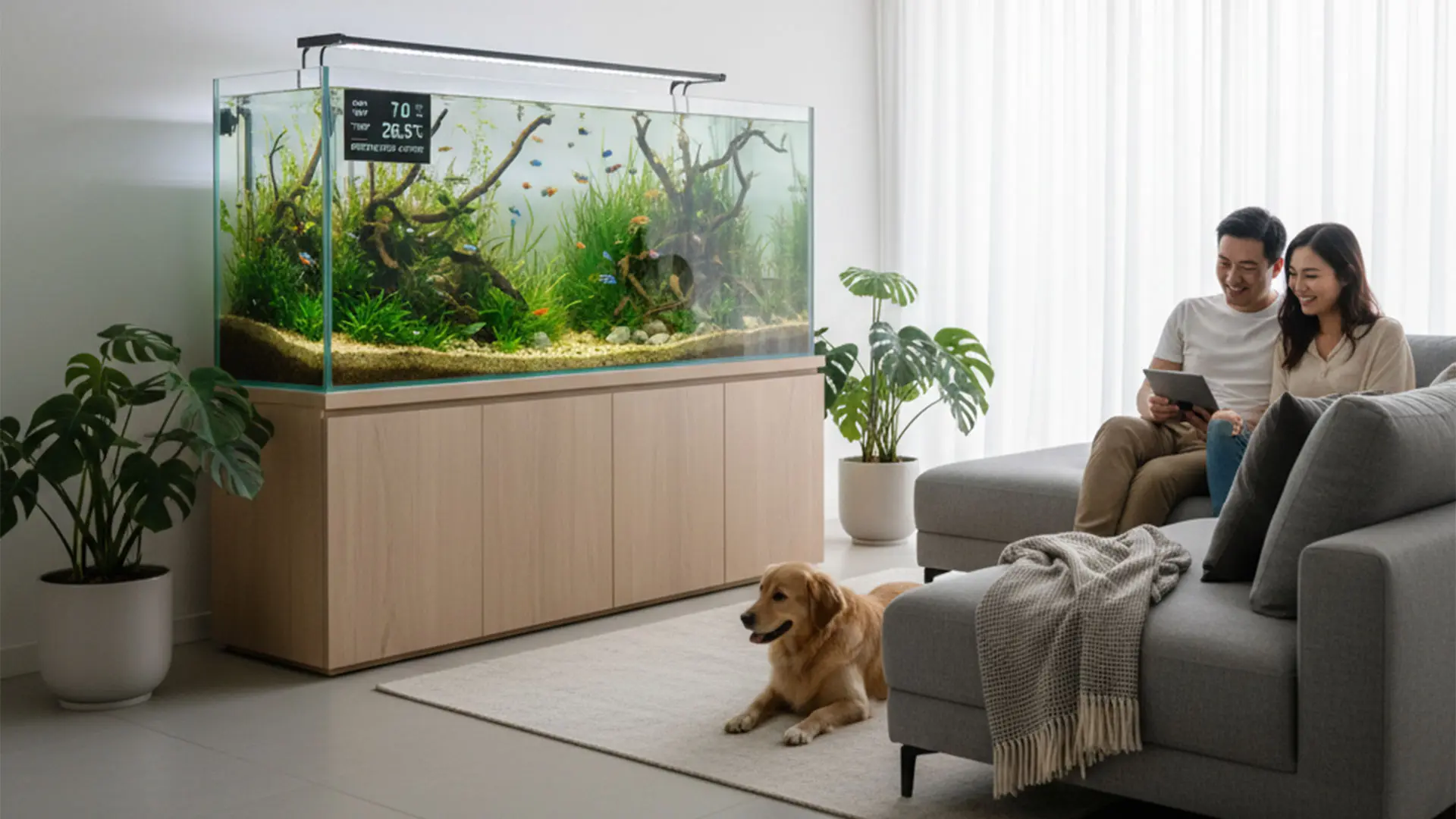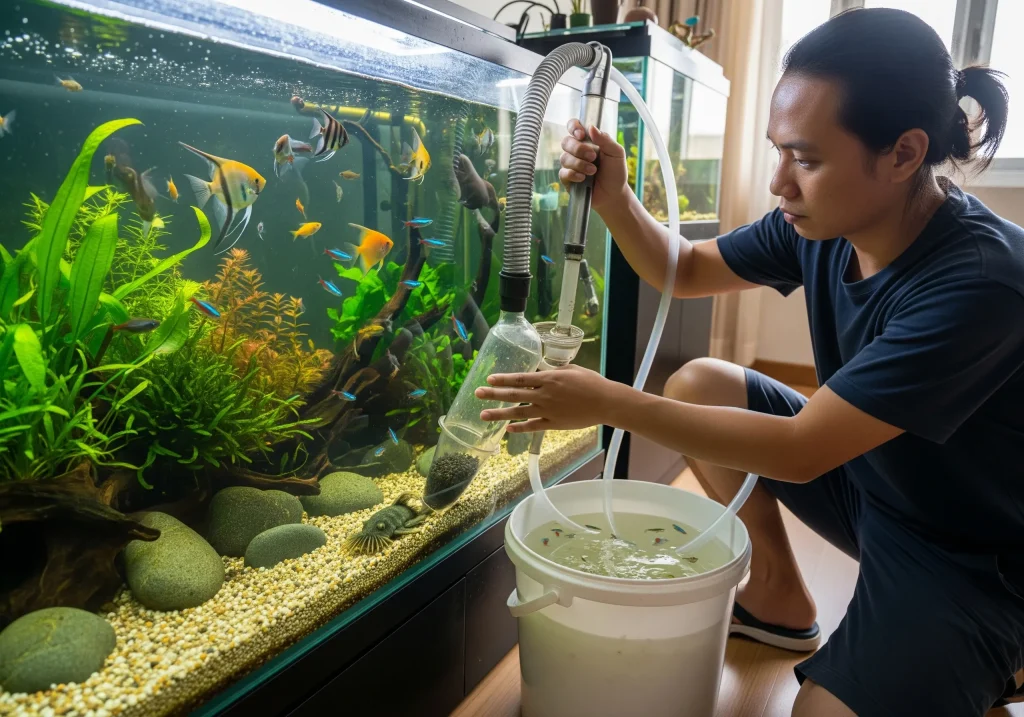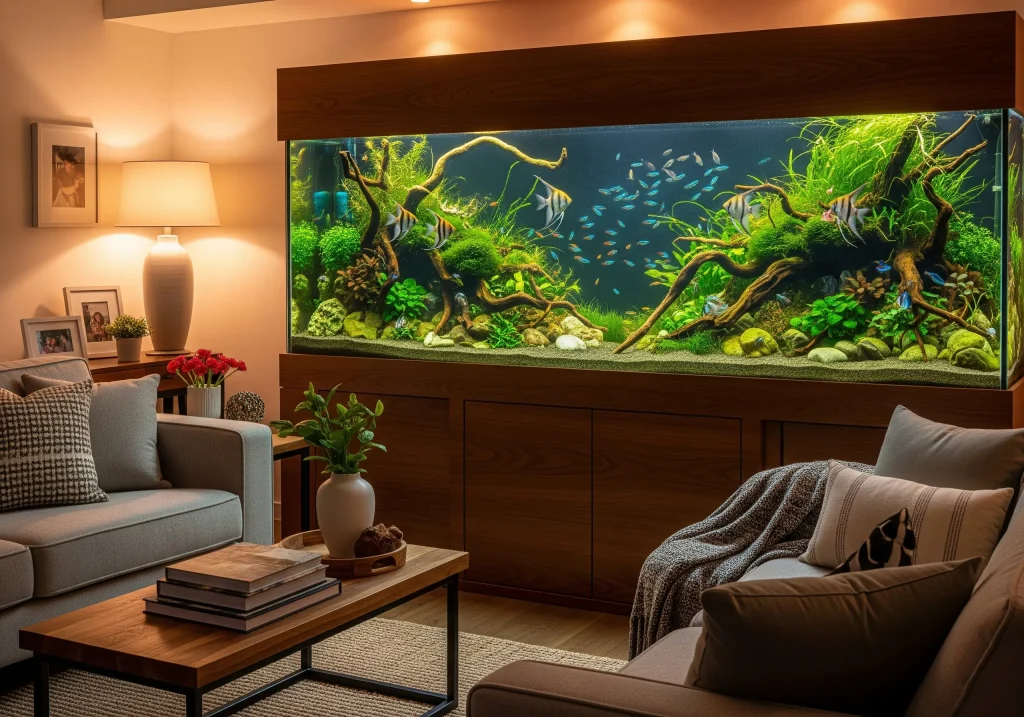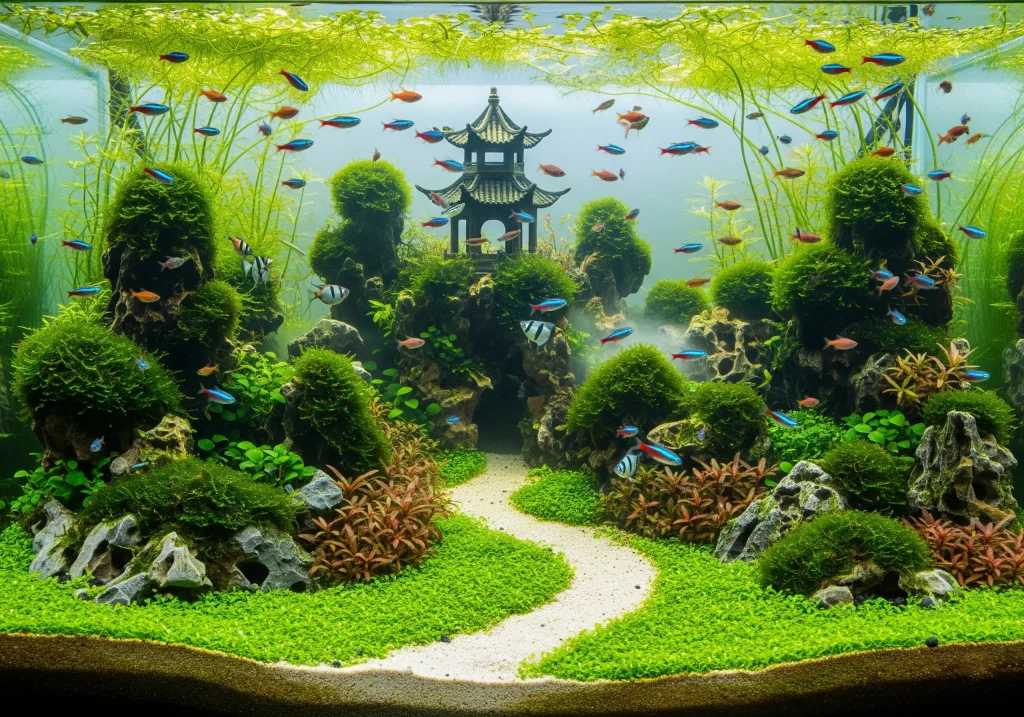A no water change aquarium systems Malaysia is a modern setup that uses advanced biological filtration, automated dosing, and smart sensors to keep water conditions stable without weekly manual changes. Designed for busy urban lifestyles in Kuala Lumpur, Kepong, and Petaling Jaya, these systems save time, reduce water waste, and provide sustainable fishkeeping. Local providers such as Seazone Malaysia and Aqua Arte Kepong are bringing eco-friendly, low-maintenance aquariums to homes, offices, and restaurants—making aquascaping more accessible than ever.
Table of Contents
Introduction: Why Malaysians Are Looking for Smarter Aquarium Solutions
If you’ve owned an aquarium, you know the drill—siphoning buckets of water every week, battling algae blooms, and praying your fish survive the stress of constant changes. In Malaysia’s tropical climate, with average temperatures between 26–32°C, biological activity happens fast, meaning aquariums often deteriorate quicker than in temperate countries.
For fish lovers in Kuala Lumpur and surrounding areas, the issue isn’t passion—it’s time. Many hobbyists are professionals, parents, or students who love aquariums but can’t dedicate hours every week to cleaning. That’s where no-water-change aquarium systems come in, offering low maintenance, eco-friendly, and sustainable fishkeeping without compromising beauty.
Fishkeeping is no longer just about patience—it’s about technology meeting passion.
What Exactly Is a No Water Change Aquarium Systems Malaysia?
At its core, a no-water-change system is designed to replicate nature. In rivers, lakes, and ponds, water is constantly filtered by plants, microorganisms, and natural cycles. The goal is to bring that balance indoors.
Key Features:
- Biological filtration at scale: Powerful colonies of bacteria convert harmful ammonia → nitrite → nitrate.
- Smart monitoring: Sensors track water parameters 24/7, sending alerts if something shifts.
- Automated dosing: Systems that release minerals, trace elements, or beneficial bacteria when needed.
- Integrated filtration: Multi-stage filters (mechanical, biological, chemical) work together for months without disruption.
👉 Example: Seazone Malaysia’s hidden core filtration combines bio-enzymes + high surface media to reduce manual care. Many modern setups are marketed as an automated aquarium system Malaysia hobbyists can rely on, combining sensors, filtration, and auto-dosing units for effortless care.
Why It Works in Malaysia
Because our tropical conditions accelerate waste buildup, stability is critical. These systems are designed to minimize water change frequency, reducing it from weekly to only once every 3–6 months, or in some cases, not at all if balance is maintained.
Why Malaysia Needs Smart Aquariums
For urban lifestyles, the appeal is clear: a low maintenance aquarium Malaysia owners can trust means more time enjoying the view, less time hauling buckets. According to 6Wresearch, Malaysia’s aquarium market will grow at 7.4% CAGR (2025–2031), fueled by rising disposable income and urban lifestyles. But the more aquariums people own, the more they demand practicality.
Local Factors Driving Demand:
- Urban living: Condos in KL, PJ, and Kepong have limited space and busy schedules.
- Water conservation: Malaysia faces water supply challenges—wasting gallons weekly is unsustainable.
- Sustainability trend: Young Malaysians care about eco-friendly solutions.
- Cost-conscious mindset: While upfront systems are pricier, long-term savings on water, conditioners, and electricity balance the cost.
Traditional aquariums demand weekly cleaning. But with smart systems, time is saved, water bills are lower, and fish live healthier lives.
If you’re used to traditional cleaning, see our Aquarium Maintenance Malaysia guide for comparison.
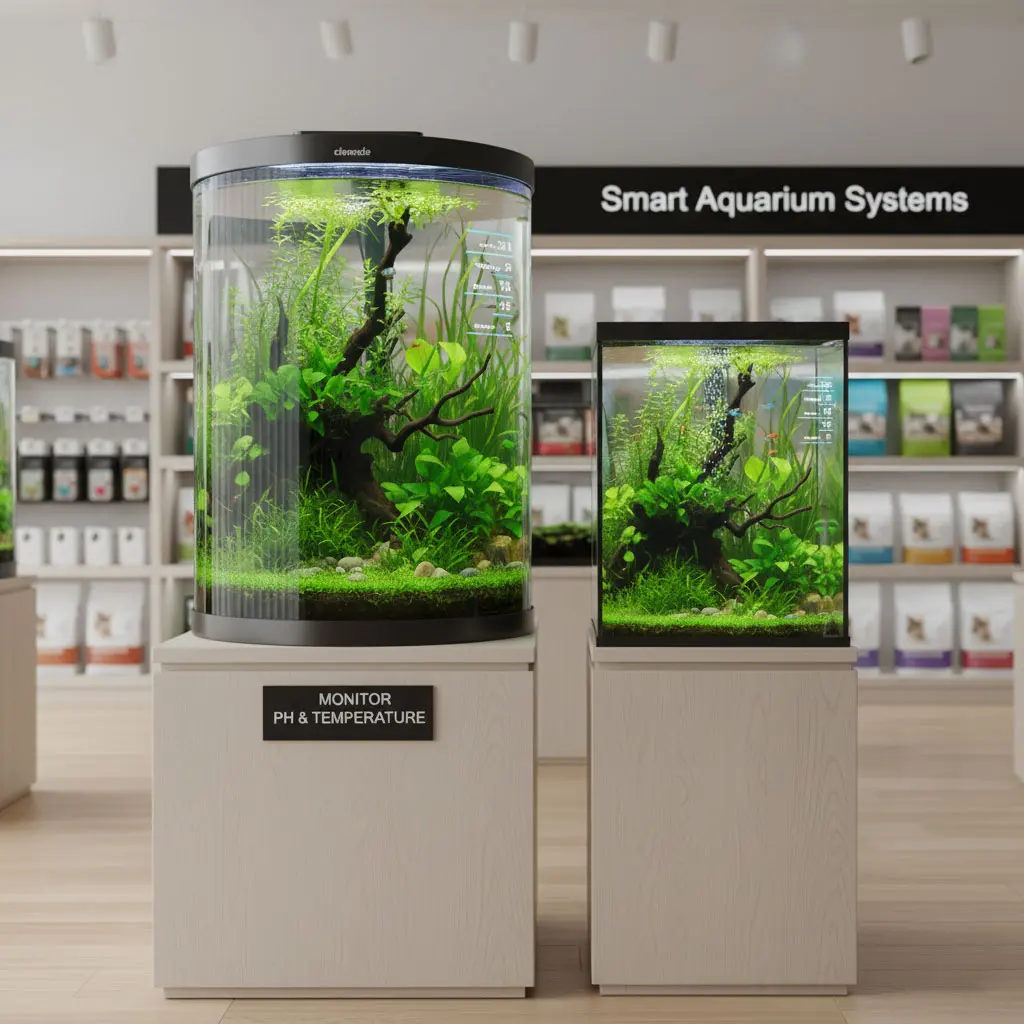
Popular No-Water-Change Aquarium Systems in Malaysia
In 2025, the rise of the smart aquarium Malaysia market reflects how fishkeeping is evolving—moving from manual care to technology-driven ecosystems, Malaysians can choose between local innovations and international imports:
- Seazone Malaysia – Local provider specializing in bio-enzyme driven ecosystems.
- Custom aquariums from Aqua Arte Kepong – Tailored to your home, office, or restaurant.
- Japanese Systems (ADA style) – Planted aquariums that achieve stability through aquascaping.
- European Imports – German brands known for automation and reliability.
Each has unique selling points—Seazone focuses on affordability, ADA on aesthetics, Aqua Arte on customization, and German imports on cutting-edge automation.
Real-Life Malaysian Experiences
Fishkeepers across KL and Selangor are already embracing these systems:
- Case 1: Kepong Condo Owner
Mr. Tan, a 35-year-old IT professional, installed a 120L smart aquarium. Instead of weekly water changes, he now does a top-up every 6 weeks. “It’s like owning a piece of nature without the headache,” he says. - Case 2: KL Café Installation
A café in Sri Hartamas used Aqua Arte’s custom system for a planted aquascape centerpiece. Customers love the serene vibe, and staff appreciate not having to deal with constant cleaning. - Case 3: Beginner Hobbyist in PJ
Sarah, a university student, started with guppies and shrimp. With automated dosing and LED lighting, her tank has been stable for 8 months without a full water change.
👉 Curious about hardy fish for these systems? Check our guide: Best Fish Species for Beginners in Malaysia.
How to Design & Install a No-Water-Change System
If you are considering an aquarium system installation Malaysia experts provide, planning your setup carefully will make the difference between a thriving ecosystem and a struggling one.
Step 1: Choose Your Aquarium Size
- Small (30–60L): Ideal for beginners.
- Medium (90–150L): Best balance of cost and stability.
- Large (200L+): For advanced aquascapers or display tanks.
Step 2: Pick Compatible Species
- Best fish: Tetras, guppies, rasboras, bettas, dwarf cichlids.
- Best plants: Anubias, Java fern, Amazon swords.
- Avoid: High-waste fish like goldfish unless system is oversized.
Step 3: Smart Equipment Setup
- Sensors for pH, ammonia, and temp.
- Auto feeders for consistent diets.
- LED lighting on timers.
- CO₂ injection for planted tanks.
Step 4: Maintenance Routine
- Check sensors weekly.
- Refill dosing solutions monthly.
- Clean glass as needed.
For detailed maintenance comparisons, revisit Aquarium Maintenance Malaysia.
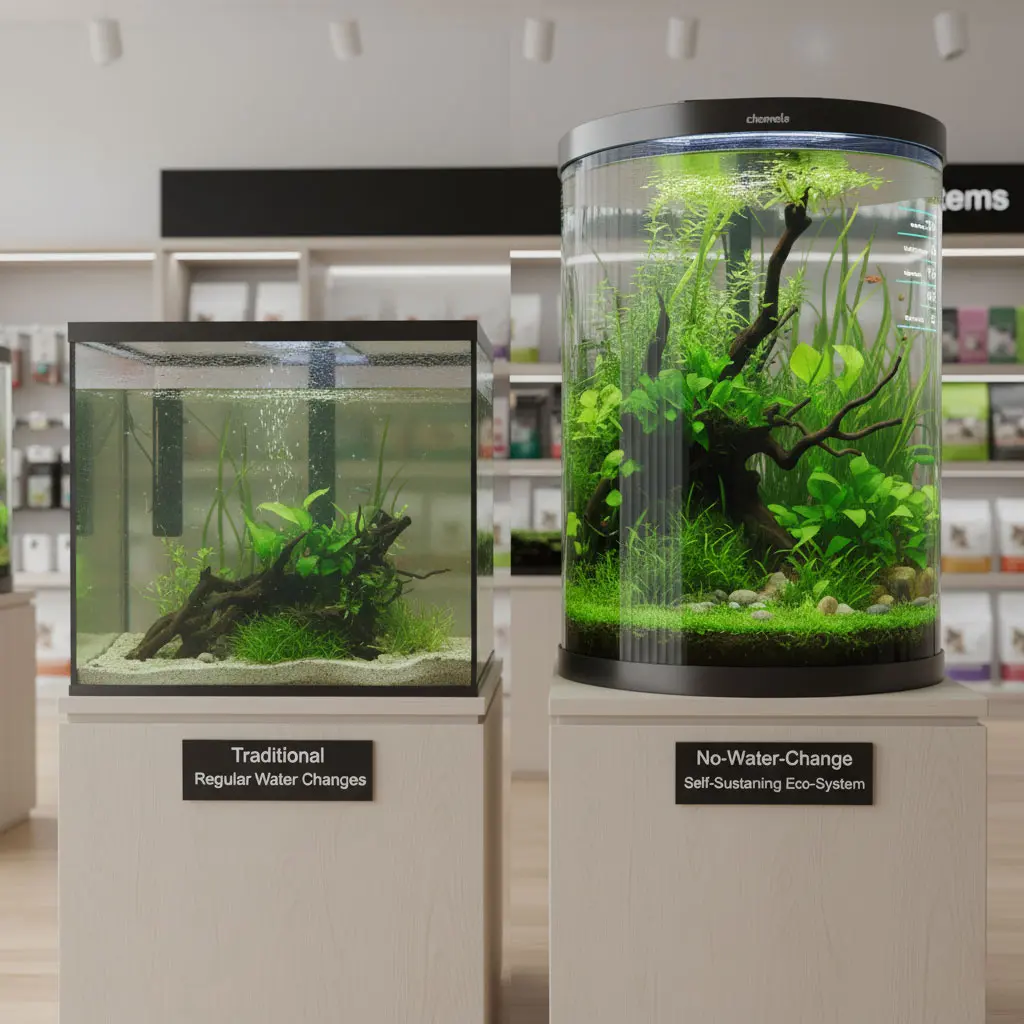
Cost & ROI in Malaysia
Let’s break down expenses over 2 years:
| Factor | Traditional Aquarium | No-Water-Change Aquarium |
|---|---|---|
| Equipment | RM 500–1,200 | RM 2,000–5,000 |
| Water conditioner | RM 300 | RM 50 |
| Water bills | RM 200 | RM 40 |
| Time investment | 100+ hrs | <20 hrs |
| Fish health risk | Higher | Lower |
📌 ROI timeline: Within 18–24 months, the smart system pays for itself in water savings, reduced stress, and longer fish lifespan. Beyond cost savings, many see this as a sustainable aquarium Malaysia solution, reducing water waste while keeping fish and plants healthy long-term.
Frequently Asked Questions (FAQ)
1. Do I ever need to change water?
Small top-ups are needed, but weekly 30% changes are gone.
2.How do I know my system is working?
Smart sensors alert you when parameters shift.
3.Can I keep shrimp or snails?
Yes—shrimp and snails thrive in stable systems.
4.Does it work for saltwater tanks?
Yes, though costs are higher due to advanced equipment.
5.What if there’s a blackout in KL?
Backup power or UPS ensures filtration continues.
6.Are these systems noisy?
Most modern systems are nearly silent.
7.How much electricity do they use?
Typically RM 10–20/month, depending on tank size.
8.Is it beginner-friendly?
Absolutely—especially paired with hardy fish.
9.Where can I buy in Malaysia?
From Seazone Malaysia or Aqua Arte Kepong.
10.Can it be customized for restaurants or offices?
Yes—Aqua Arte offers custom installations tailored for commercial spaces.
11. What is the best aquarium maintenance solution Malaysia fishkeepers can adopt in 2025?
The most effective option is investing in a no-water-change or automated system, which provides stability, convenience, and eco-friendliness compared to weekly manual cleaning.
The Future of Fishkeeping in Malaysia
The future is not just about automation but also sustainability. An eco-friendly aquarium Malaysia households adopt will align with global green living while making fishkeeping accessible to everyone. We’re entering an era where aquariums are not just beautiful décor but smart ecosystems.
- IoT integration: Imagine tanks connected to your phone, sending water alerts.
- AI fishcare: Predicting fish stress or disease before symptoms appear.
- Eco sustainability: Reduced water use aligns with Malaysia’s conservation goals.
Whether you’re in Kepong, KLCC, or Penang, the message is clear: the future of aquariums is sustainable, smart, and stress-free.
And with partners like Aqua Arte Kepong by your side, that future is already here.
